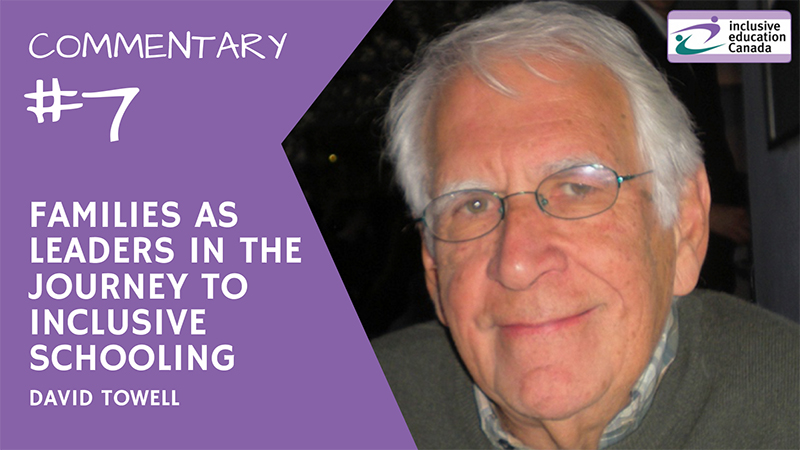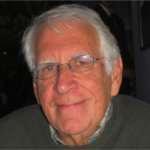 National Inclusive Education Month Commentary #7
National Inclusive Education Month Commentary #7
By David Towell, Centre for Inclusive Futures, United Kingdom
Last year I had the privilege of writing a pamphlet, titled Advancing Inclusive Education, with Gordon Porter where he tells the more than 30-year story of establishing inclusive education throughout New Brunswick. Viewed from across the Atlantic, what is most striking about this story is how few other jurisdictions have achieved the same transformation in the system of education. In much of the U.K. and most other countries this transformation remains a major challenge for all of us who believe in the rights of disabled people and the need to build more inclusive societies.
Indeed for many and perhaps most families the experience of gaining equitable and quality inclusive education for their disabled children remains a continuing struggle, even where legislation suggests it should be otherwise. No surprise then that a mutual aid website which helps parents in the U.K. is called Special Needs Jungle.
Families and their associations (like the ACLs in Canada) need to be at the heart of improving education and become genuine partners with teachers and policy-makers in delivering the transformation to inclusion. This short article is addressed to parent leaders taking up this challenge but written with their potential professional partners in mind: partnership has to be driven from all ‘sides’.
In preparation for a session we have offered to Inclusion International‘s upcoming global Congress (Learn, Inspire, Lead 30th May – 1st June, Birmingham, U.K.), I have been talking with three mothers who, after giving birth to intellectually disabled children, have taken on national leadership roles in three rather different countries. Monica Cortes is director of Asdown in Colombia. Linda Jordan led a family network which had major success in achieving educational transformation in one of London’s poorest boroughs. Madalina Turza is director of the European Centre for the Rights of Children with Disabilities, based in Romania.
Of course they have rich personal stories of the struggles they and their children have made, and are making to live their lives to the full. There is both much joy and many tears in these stories. But looking across their three countries and others we know, we have sought to identify the key strands in the strategies family associations need to develop in order to advance wider change in education. Five seem most important.
First, networks and associations of families need to develop their own capacities to be effective. Marshall Ganz has written (Oxford University Press, 2009) a great book about the struggles which originally gave rise to President Obama’s campaign slogan Yes We Can! under the title Why David Sometimes Wins (in battles with Goliaths). We have to see ourselves as change agents: establishing a clear vision, identifying and amplifying our membership and its assets and focusing our efforts where these will have most impact.
Second this vision for inclusive education must be ambitious, seeking to ensure that all students are not only present but active participants in the life of local schools and achieving well in relation to their own aspirations and talents: that is, firmly grounded in Article 24 of the UNCRPD.
Third, we need to follow Article 24 in seeing that achieving this vision requires radical change in educational systems so that every school is supported in this transformation and inclusion becomes an intrinsic feature of policy, culture and practice from the classroom to the education ministry and a core expectation of the communities in which schools are embedded. This means campaigning, among other things, for a holistic appreciation of education as education for life, for committed government leadership and proper investment in equity and quality, for appropriate reforms in professional education, for active attention to removing the barriers to student participation and for the creative development and sharing of inclusive pedagogies.
Fourth, every jurisdiction is, of course, different. Taking, for example, the three countries where Monica, Linda and Madalina exercise leadership, there are differences in national policy commitment to human rights, the opportunities for democratic influence and whether public institutions welcome civil society associations as partners. There are also differences in public attitudes to disability, the coherence in governmental leadership in education and the flexibility or otherwise of traditional teaching methods. Clearly family association strategies for educational change need to be informed by a careful assessment of the opportunities and constraints shaped by these contextual issues.
Fifth therefore, every family association, whether working locally, nationally or both, needs to plot its own pathways to achieving progress with attention to all four of the preceding themes and continually update these pathways in the light of experience.
As in New Brunswick, families and their associations need to prepare themselves for a long journey, always keeping in mind that David Sometimes Wins!
 David Towell is Director of the U.K. based Centre for Inclusive Futures. His older sister acquired severe intellectual disabilities in infancy and never went to school.
David Towell is Director of the U.K. based Centre for Inclusive Futures. His older sister acquired severe intellectual disabilities in infancy and never went to school.
